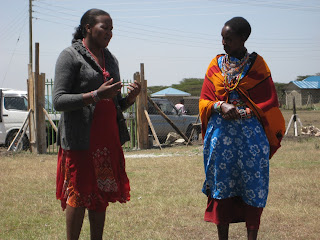We started today with a trek out to Kipeto to visit with Maggie and her Emian Integrated Development Organization (EIDO). Maggie is an MPPC-sponsored Daystar graduate. Her organization has been well supported by MPPC since she established it after graduating from Daystar in 2004 with a degree in Community Development. EIDO has broad goals to build capacity in the community to support a self-sustaining development path.
Our team was again augmented by Serah Nizomo today, as we wanted to share some more time with her and expose her to our EIDO partnership projects. Since Serah’s dream is to work with children, we also wanted to introduce her to the folks at Hekima Place as well. In addition to Serah, we also picked up Maggie's colleague, Ibrahim, and his friend Jeremy along the way.
We arrived at the Kipeto village site where several members of the community members of EIDO (nearly all women) were assembled for our meeting. It was a beautiful day and the women were dressed in their traditional colorful Masai beaded jewelry and dress. The scene was a “pure Africa” moment for us as we saw many zebra and antelope mingling on the open, rolling savannas with the Masai herds of goats, cows and sheep as we alternatively sped, bumped and crept along a variety of roads to Kipeto. After some quick introductions we were greeted by wonderful traditional song led by Ibrahim’s mother. Maggie followed with an opening prayer and followed with a summary of some of successes and challenges EIDO has experienced in the last year or so.
Then several of the community members volunteered to share how EIDO has helped to improve their lives and their chances of surviving the next potential drought. As Maggie translated from Maa (the Masai language) into English, each of these powerful personal examples from the EIDO community members helped to affirm in our minds that capacity for change within the community is real. These women were sincerely appreciative of the tangible benefits of water (through the borehole well project) and knowledge (training and awareness of vegetable gardening) that they had received through EIDO.
As the EIDO women shared their stories and appreciation, they became more comfortable with the group and enthusiastically responded to a few questions that we had about their progress and plans for the future. Despite the challenges of stolen fences around the community vegetable garden and its subsequent destruction by wild pasture animals and the unfortunate diseased chicks that infected and significantly reduced the initial poultry flock of 500 for the community, the women had learned a great deal. They feel better prepared and informed and have even saved some corn to help stretch their food supply through the dry season.
Interestingly, we discovered though the conversation that most, if not all, of the EIDO community women have a bank account accessible by mobile phone where they can save money from beaded jewelry sales. This ability to save even a little bit of money though handicraft sales was also recognized as a key enabler of sustainability for the community to reduce their dependence on cyclic drought aid in times of need.
As the meeting with the community women concluded, Greg Nevers led all who were there to gather around the EIDO women in prayer circle. His prayer for them and for our endeavors with EIDO was more than a symbolic gesture. This special moment, and many other similar prayers with our Kenyan brothers and sisters through the last few days, helped to connect us together and build our relationships through Christ-centered communion with our mission partners.
Before the group broke up to attend lunch at Maggie’s home, we were all honored with traditional Masai shukas as gifts! Check out these photos of our team sporting our honorary Masai regalia.
Lunch at Maggie’s home was another delicious meal of sodas, chapati, and fried beef. Scott was able to present them with two crocheted blankets made by his daughter and Maggie’s daughters each received one with many thanks. We each also recieved a special blessing of being granted a Masai name by Maggie's mother and elder members of her family. This is a Masai tradition where guests and friends of Masai are sized up by the granting elders and "offcial" Masai names are bestowed upon the visitors. Tim lucked out with the Masai name of 'Lerionka' which means "man with many cattle".
After parting ways with Maggie, we made a stop at the Hekima Place. Hekima is a home for orphaned or abandoned girls; especially those that have been left behind by parents who have died from HIV/AIDS. Their 10 acre facility is beautiful and includes its own mini-farm and livestock to make the mission more self-sustaining. Started several years earlier at a nearby rented space, their new facility was completed in 2010 and can house up to 70 girls of all ages. The founder (now 74 years old) has an inspiring life story and unstoppable drive to help children. The organization is well funded by churches around the Pittsburgh, PA area and is guided by a local Kenyan board of advisors as well as a board in the U.S. Hekima represents another successful model mission for us to study and potentially support. In the immediate term we are connecting Serah to Kate, Hekima's founder, in hopes of matching her up with Hekima for her final “practicum” experience as she completes her course of study at Daystar in Community Development.
Leveraging our knowledge and connections with Hekima to help our sponsored student at Daystar is just another example of how important our relationships, and indeed our network of partner relationships, can be used to do God’s work in the world.

























